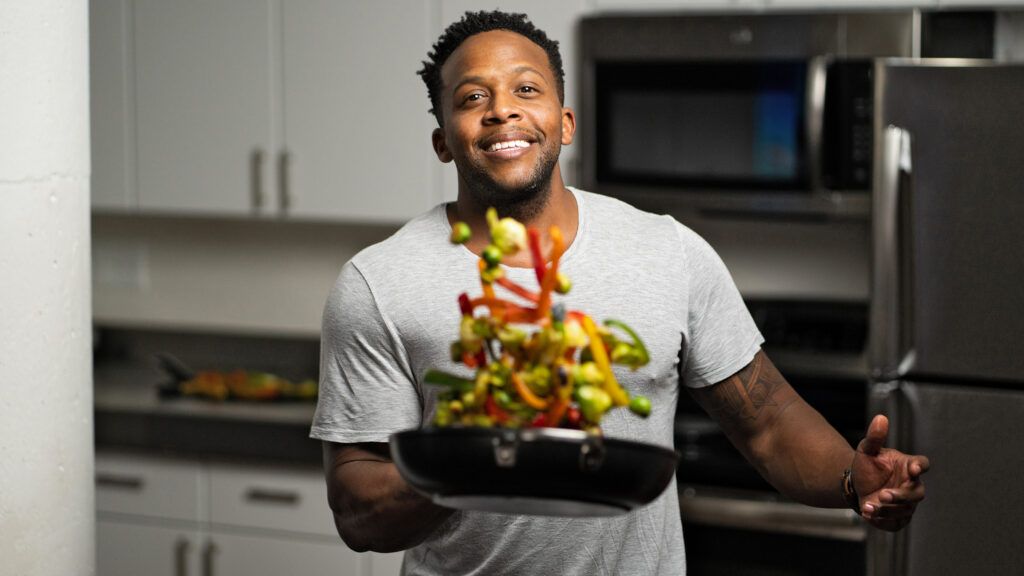I’d known her since middle school. That’s why I’d felt comfortable inviting myself over to her place that night. “Just thought we could catch up,” I’d told her, which wasn’t exactly true.
I had just picked out my hair, so my twists were a bit longer than usual; when wet they would hang nearly over my eyes. I flashed a big disarming smile. “I’m great,” I said. “Got some big projects coming up at work.”
Also, not exactly true. I was 28, a year out of Harvard’s Kennedy School of Government, working in city government on a yearlong fellowship. To my family and friends, I was on the fast track. But inside I was tormented by dark, self-destructive thoughts I’d wrestled with since I was a kid. I was at least 30 pounds overweight. My latest girlfriend had essentially dumped me, saying she was “just moving on.” Not that I could blame her. My whole life, I’d kept everyone at arm’s length, never revealing the real me, making it hard to get close.
I’d been taught that my depression came from a lack of faith. Another way I was falling short. It made me angry at God. Why wouldn’t he help me? I’d decided to take matters in my own hands. This last get-together with my old friend was fitting. I only hoped, when it was all over, she and others would be able to forgive me, to understand that I could no longer live with the torment.
My dad had been the GM of a large automobile plant in Dallas. It provided a comfortable life for my mom and older brother, Chris, and me. My mom showed her love through her cooking: Southern favorites like fried catfish and cheese grits, and Cajun dishes from her Louisiana roots. A clean plate was both polite and customary.
We attended one of the city’s largest churches. Our minister preached that God poured out his blessings on the faithful. The evidence was all around us. We lived in a nice house. Chris and I went to a private school.
Then, when I was eight, my dad was diagnosed with a debilitating disease and went on permanent disability. My mom began working two jobs. And Chris and I were sent to public school, where I struggled to fit in from Day One.
The other kids made fun of my voice and the words I used. My dad was an English major, so at home he’d correct me and my brother if we got lax. My inability to code-switch at school made me an easy target. But by then, I was already a master actor. I could laugh and joke my way through the day while feeling I might implode at any moment.
I’d go home and straight to my room, filling notebooks with my angst. I hate that I’m so different. I’m always sad inside. Why can’t I rest?
In high school I found relief in an art class. There was one character I drew over and over again. A young black man in a T-shirt and blue jeans, whose dreads covered his face. I drew him in various fatal scenes. Lying in a pool of blood. Even hanging. I didn’t think of him as me. For one thing, my head was a shaved, clean college cut.
One day my dad found my drawings. All he could ask was, “What’s wrong?” My mother just sobbed.
I was ashamed and embarrassed. There was no talk of going to a therapist or a psychiatrist. In the black and church communities, there wasn’t much discussion about mental health. You were supposed to “go to God and lay it on the altar.” Only problem: I didn’t exactly know what to lay down, so I just repeatedly asked God to “make me feel better and not sad.” Between Dad being in and out of hospitals and Mom working to keep everything together, I didn’t want to be a bigger burden. I tried to live in the shadows.
I excelled at academics. I got a bachelor’s degree in business. Then Harvard for grad school. Boston is where things changed for me. The pressure to succeed was intense. And the cold, dark weather awakened something that had largely been dormant and contained—my depression. I started drinking almost every night. Then the 2008 stock market crash sent me right back to the place I thought I had escaped, literally and figuratively.
I’d been home with my parents for a year. My job wasn’t what I’d thought it would be. I felt stuck. I wasn’t sleeping. In desperation, I went to a Christian therapist; I saw her three times. Nothing changed, and our conversations were just on the surface. I’d skipped the past two appointments. I doubted she even cared. Soon enough that weekend, the torment, would be over. I’d even drawn lines on my arm to guide the razor blade. This get-together with my old friend was one of the last things on my list.
“So tell me what’s been up,” my friend said.
Just then my phone rang. “Kevin, apologies for calling out of the blue, but you’ve been on my mind this week. Will you come meet me tomorrow?”
My therapist. Worried about me? Her concern felt genuine. Like an answer to a cry for help. One I’d never uttered to anyone but God.
“Yes, tomorrow works,” I told her. The rest of the night was a blur—I kept thinking about the phone call.
The next day, after work, I went to my appointment. This meeting was different; the therapist was intent on digging deep. She asked about my drinking, my dreams, my mental health. Then she saw the lines on my arms. “Are you having thoughts of hurting yourself?”
When haven’t I? I thought. Those gruesome drawings from high school flashed through my mind; I hadn’t thought about those for more than 10 years. I started shaking when I realized that I now looked like the man in the drawings. There I sat in the office wearing a plain T-shirt and blue jeans, with long, picked-out twists. It was me I’d been drawing all along. I was broken. Through tears I said, “Lately, yeah, I’ve been thinking of actually doing it.”
“Kevin, let’s get you more help,” the therapist said. “There’s no shame in getting treatment. Depression is an illness. It’s not from a lack of faith or personal weakness.”
That’s not what I’d grown up believing. I thought my incessant depressive thoughts were from not trusting in God strongly enough, reminding me that I was disappointing him.
I went to a hospital and was discharged into the care of my parents. I told them everything. It was a difficult conversation, but simply being open and honest was incredibly freeing. As if I were seeing the world for the first time. I later met with a psychiatrist. He gave me further insight into depression and anxiety disorders, then prescribed an antidepressant.
My depression and anxiety were due to a host of things, from genetic vulnerability to stressful life events to a chemical imbalance in my brain. My perceived lack of faith was not a cause. With the help of medication, the sadness felt less overwhelming. I became more motivated to get in shape. To eat better. My prayers began to change. No longer did I ask God to fix me. There was a comfort now I’d never known before. An acceptance that I was exactly where I needed to be. Peace.
I’d never cooked anything but the simplest of meals: frozen chicken breast, canned green beans and instant brown rice. Now I searched the internet for healthier recipes and enjoyed discovering foods I never ate growing up (and could hardly pronounce), such as quinoa and arugula.
By now I’d gotten a new job, managing social media for a large computer company. I decided to post pictures of the dishes I was making on a Tumblr blog to build community around healthy food and get free advice on my diet.
One day I was at the gym when an older muscular white man came up to me. “Hey, I’m Greg,” he said. “What are you training for?”
I pulled out my earbuds. “Nothing,” I mumbled. “Just trying to lose some weight and gain muscle.”
“What’s your plan?”
My blank stare told him that I didn’t have one.
“I see that you work hard, but you have to have a plan if you want results,” Greg said.
I knew about strategic plans at work. I’d just never thought of applying the same principles to a workout routine.
Greg spent the rest of the hour working out with me, cheering me on each set and even showing me more exercises. He was like a personal trainer, but this was totally on his own. A guy I would have thought I had nothing in common with: twice my age, conservative politically, intense, a bodybuilder.
“I’ll see you tomorrow,” he said.
We worked out weekly. And equipped with a strategy, I started to see my body change faster. But it was also Greg, having someone to be accountable to.
I stopped using alcohol to medicate. Little by little, I grew more open with my friends and family. Depression only worsens when you keep it a secret.
And there was one surprising passion I found: cooking. Cooking focused me. I planned my grocery list, set out all the ingredients and utensils I’d be using. There was an order to how I prepared the foods. Having a plan made everything easier, smoother. I got daring and started experimenting and creating my own recipes.
I loved engaging with others, so I created an Instagram account called FitnessAndFaith. I posted words of inspiration and reflection along with photos of my journey in food. The account grew slowly, but that didn’t matter; I loved connecting with people.
One day I posted a photo of a banana split I’d made with Greek yogurt, granola, berries and chocolate chips. It went viral. I went from 10,000 followers to more than 100,000 in less than three months! People were turning to me for fitness tips, healthy meals that didn’t take a lot of work and a daily pick-me-up to stay positive.
Every day there were hundreds of messages, sometimes thousands—a connection I never could have imagined possible. I think it was because I was honest about my struggles with food and depression. I had come out of the shadows.
I changed the name of my Instagram to @fitmencook and, in 2014, left my job to pursue this newfound passion. Five years later, with more than two million social media followers, two best-selling apps (with over one million downloads) and a top-selling cookbook, I can say my passion hasn’t faded; it’s only grown stronger.
As has my faith, nourished in the light where it was once in darkness.






